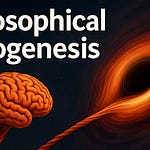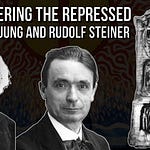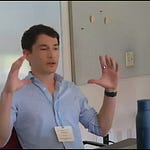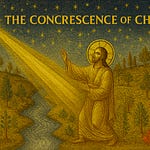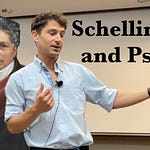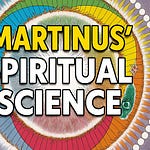ChatGPT summary of our conversation: Roman and Matt engaged in a wide-ranging conversation that traversed philosophy, personal agency, societal evolution, and the human condition. The dialogue began with Roman inquiring about Matt's preparations for an upcoming presentation to fellow Whitehead scholars. Matt reflected on the challenge of presenting new insights within a field already rich with scholarly work. He mentioned the extensive publications on Alfred North Whitehead's first year at Harvard and the debates surrounding interpretations of his ideas, particularly those involving scholar Lewis Ford.
Matt acknowledged that while much has been written about Whitehead's development of concepts during 1924-1925, he hoped to contribute fresh perspectives. He aimed to move beyond the "philosophical trivia" of pinpointing when Whitehead conceived certain ideas, instead focusing on what those ideas mean for our understanding of existence. Matt emphasized the importance of demonstrating a deep engagement with Whitehead's texts and situating philosophical points within the biographical context of Whitehead's life, especially his classroom teachings from a century ago.
Roman asked whether Matt felt a sense of communion or divergence when interacting with other Whitehead scholars. Matt affirmed that there is broad agreement and a shared appreciation for Whitehead's work, noting that it offers more than just a new theory—it presents a new civilizational impulse. This shared vision fosters a sense of urgency among scholars to make Whitehead's ideas effective in practical contexts. However, he also acknowledged that disagreements exist, particularly concerning the relationship between atomism and continuity in Whitehead's philosophy (related to Ford’s controversial thesis).
Delving deeper, Matt explained that this abstract debate has significant implications for concepts like freedom and individuality. If nature's unfolding is seen as a pure, unbroken continuum without individuality, then the notion of freedom becomes untenable. Whitehead, a process thinker, introduced the concept of "actual occasions" as atomic units, balancing continuity with discrete moments of decision and self-realization. Scholars debate when exactly Whitehead developed this idea and whether it was a sudden revelation or a gradual refinement. Matt believed this seemingly abstract conceptual issue matters not just for philosophical history but for understanding human freedom and our place in the universe.
The conversation shifted to the practical significance of these philosophical ideas, particularly in the context of personal agency and societal constructs. They discussed the impact of materialistic views that deny free will, considering how such perspectives might shape individual behavior and societal norms. Matt argued that if people come to believe they are merely programmed entities without conscious agency, society may increasingly reflect that mechanistic view, leading to a loss of creativity and freedom. He emphasized that our thoughts and language shape our being, and embracing a deterministic outlook could lead to a self-fulfilling prophecy.
Roman brought up the creative process, noting that moments of inspiration often feel effortless, as if ideas are gifts rather than products of deliberate choice. This observation led to a discussion about the interplay between effort and grace in the pursuit of creativity and enlightenment. Matt agreed, emphasizing the importance of preparing oneself to be open to inspiration while recognizing that true creativity often arises when one becomes a vessel for ideas beyond conscious control. They touched on the paradox of striving for freedom and enlightenment: effort is necessary, yet too much striving can impede the very state one seeks.
The dialogue then explored the broader implications of societal development and decline. Roman questioned whether people throughout history, such as during the fall of the Roman Empire, were aware of the collapse happening around them or if the sense of impending doom is a perennial aspect of the human psyche. Matt suggested that while civilizations rise and fall over extended periods, significant events like the sacking of Rome are felt acutely by those who experience them. He posited that humanity has an inherent sense of the apocalyptic, driven by a moral response to the disparity between ideals and reality.
They examined the current state of civilization, discussing whether modern society is experiencing a unique kind of decline due to its unsustainable relationship with the biosphere. Matt compared the potential collapse of contemporary civilization to historical precedents but noted that today's challenges are global in scale. He expressed concern that while previous civilizations faced localized environmental issues, the modern world grapples with planetary-scale problems that could have unprecedented consequences.
The conversation turned to the role of myth and whether a new unifying narrative could emerge to guide humanity through these challenges. Matt reflected on the writings of Carl Jung, suggesting that myths cannot be constructed deliberately but arise organically from the collective unconscious. He emphasized that while we cannot fabricate myths to order, we can cultivate the psychological and cultural conditions that allow new myths to take root. This involves fostering openness, community, and dialogue, preparing the soil for new ideas to flourish.
Roman questioned the feasibility of creating a new myth, referencing Joseph Campbell's assertion that it might not be possible for several generations. Matt acknowledged the difficulty but expressed hope that by planting the seeds of philosophical ideas and nurturing the right cultural environment, a new mythos could eventually emerge. They agreed that while technological and material advancements have provided comforts, they have also led to isolation and a loss of deeper connections and meaning.
Delving into personal experiences, Roman shared his reflections on materialistic philosophies that deny free will. He recalled reading works like Richard Dawkins’ The God Delusion and how they initially felt liberating but ultimately served as justifications for selfish behavior. Matt concurred, criticizing the deterministic narrative that reduces humans to programmed machines. He argued that such views undermine the sense of purpose and agency essential for individual fulfillment and societal well-being.
The dialogue touched on the importance of love, morality, and the potential for spiritual growth. Matt cited Emerson's belief in the transformative power of love and the possibility of societal revolution through genuine affection and unity. They discussed the challenges of living in accordance with these ideals, especially in a world rife with injustice and suffering.
Roman raised difficult questions about the application of these principles in extreme situations, such as acts of violence or war. He wondered whether advocating for love and nonviolence is feasible when confronted with aggression and whether one can maintain spiritual equanimity in the face of personal loss. Matt acknowledged the complexity, differentiating between immediate anger in response to harm and the cultivation of hatred over time. He suggested that acting to neutralize a threat out of a sense of love and duty is different from seeking revenge fueled by hatred.
They explored teachings from various spiritual traditions, including the Bhagavad Gita, which addresses acting without attachment to outcomes. Matt emphasized that living in love does not equate to passivity or allowing oneself or loved ones to be harmed; rather, it involves conscious, ethical action grounded in compassion.
The conversation then navigated the contentious topic of historical atrocities and the interpretation of history. Roman mentioned modern reinterpretations of past events, such as AI-generated speeches of historical figures like Hitler, and the potential dangers of reframing narratives in ways that could be misleading or harmful. They discussed the ethical implications of technology enabling the spread of extremist content and the responsibilities that come with freedom of information.
Matt grappled with the balance between censorship and the free exchange of ideas. He expressed concern over who decides what content should be restricted and the slippery slope that censorship can entail. At the same time, he acknowledged the need to be vigilant about how certain content might influence society, especially if it glorifies or trivializes historical atrocities.
In concluding their dialogue, Matt reiterated the importance of love as a guiding principle. He read an excerpt from an anthroposophist author named Georg Kühlewind emphasizing that love drives out hate, aversion, and fear. The passage underscored the idea that one must begin with oneself in fostering love and understanding, rather than waiting for others to change. This return to the theme of love highlighted their shared belief in the power of compassion and ethical action as foundational elements for individual growth and collective progress.
Watch the video of our dialogue here:





